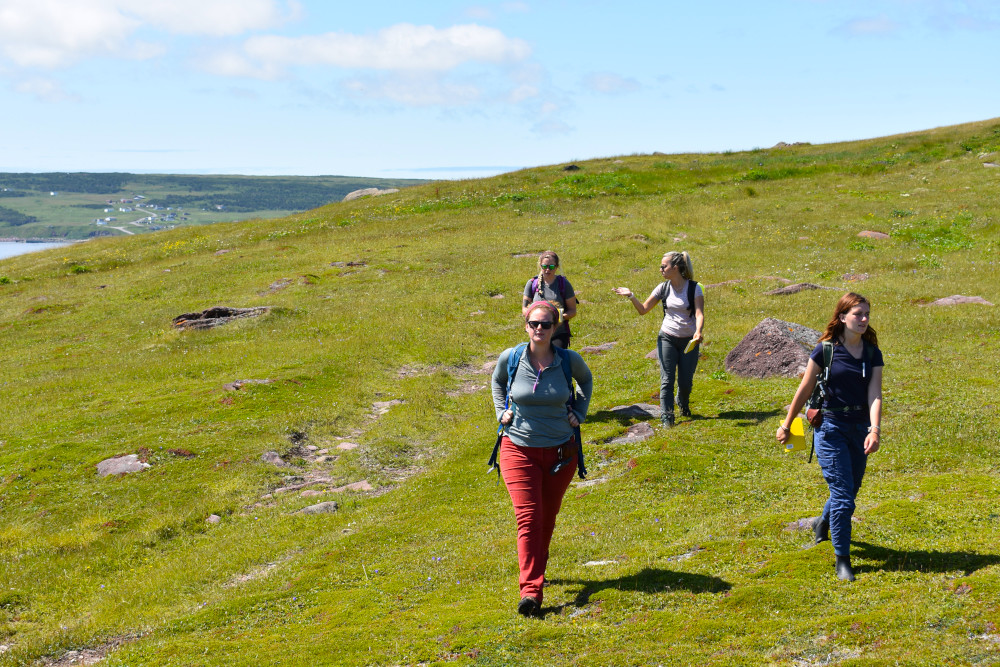A unique field camp experience.
The Wilkes University geology field camp is an intensive, project focused international field camp located on the island of Newfoundland in Canada and is open to upper-level geoscience students enrolled at any college or university.

Newfoundland offers a unique cross section of major crustal segments that comprise the Appalachian mountain belt. The field camp curriculum is designed to meet the requirements of most undergraduate Geology B.S. programs, meet the educational standards reported by the American Geosciences Institute (AGI) and many state (including Pennsylvania) professional geologist licensure programs.
Students will earn up to 6 undergraduate credits. The camp is designed for students to develop the field skills necessary to pursue a career as a Geoscientist in industry, consulting or academia. During the field camp, students will develop research strategies, collect field observations and measurements, compile detailed rock descriptions, measure stratigraphic sections and construct geologic maps and cross sections. Methods of data collection will include the application of satellite and aerial imagery, as well as geophysical surveys to supplement traditional field methods.
2025 Schedule and Itinerary
The 2025 Geology Field Camp began June 24, 2025 and ended July 25, 2025. Students arrived at Deer Lake, Newfoundland, Canada June 23, 2025 and depart July 26, 2025.
The schedule below outlines the general itinerary. While not shown below, the schedule included several built-in days with some time off for students to unwind.
| Dates | Location | Description | Lodging |
|---|---|---|---|
| 6/24 | Gros Morne National Park | Geology of Newfoundland | Gros Morne/Norris Point KOA |
| 6/25 - 7/5 | Gros Morne National Park | Green Point, Quaternary, and Cow Head projects | Gros Morne/Norris Point KOA |
| 7/5 - 7/16 | Town of Cow Head | Cow Head project | Shallow Bay Inn |
| 7/16 - 7/25 | St. John's | Flat Rock project | St. John's Home |
| 7/25 - 7/26 | Cornerbrook | Departure from Newfoundland |
MUN Cornerbrook |
Prerequisite Requirements
Students typically enroll in field camps between their Junior and Senior years. All students are required to have completed coursework that covers content traditionally found in the following areas prior to enrolling in the Wilkes Geology field camp:
- Introductory Geology
- Mineralogy
- Petrology
- Structural Geology
- Sedimentology
- Stratigraphy
If you do not meet one or more of these prerequisites please include a statement in your application that describes other course work that is a potential substitute.
Upon acceptance into the camp, students will be required to submit an official transcript and completed Wilkes visiting student application for the registrar’s records.
Credits and Cost
| Undergraduate Credit Hours | 2025 Total Cost |
|---|---|
| 4 / GEO 380 | $5,720 |
| 5 / GEO 398 A | $6,250 |
| 6 / GEO 398 B | $6,780 |
The above cost includes tuition, fees, lodging, food and travel in Newfoundland, CA. They do not include the travel costs to/from Newfoundland, nor the cost to obtain a passport or international phone plans/add-ons. Students should carry additional spending money for days off and other personal spending habits, as well as meals for break/exploration days. Some of these costs may be able to be covered by scholarships.
Wilkes University's Geology curriculum accommodates a 4-credit version of the field camp, but we recognize that other institutions require 5- or 6-credit camps. Our 4-credit field camp experience is the equivalent to most 5- or 6-credit camps and meets (if not exceeds) the educational standards reported by the American Geosciences Institute (AGI) and many state (including Pennsylvania) professional geologist licensure programs. Students enrolling for 4-, 5- or 6-credit hours will complete the same amount of work. Students will only need to pay for the amount of credits that are required for their degree program.